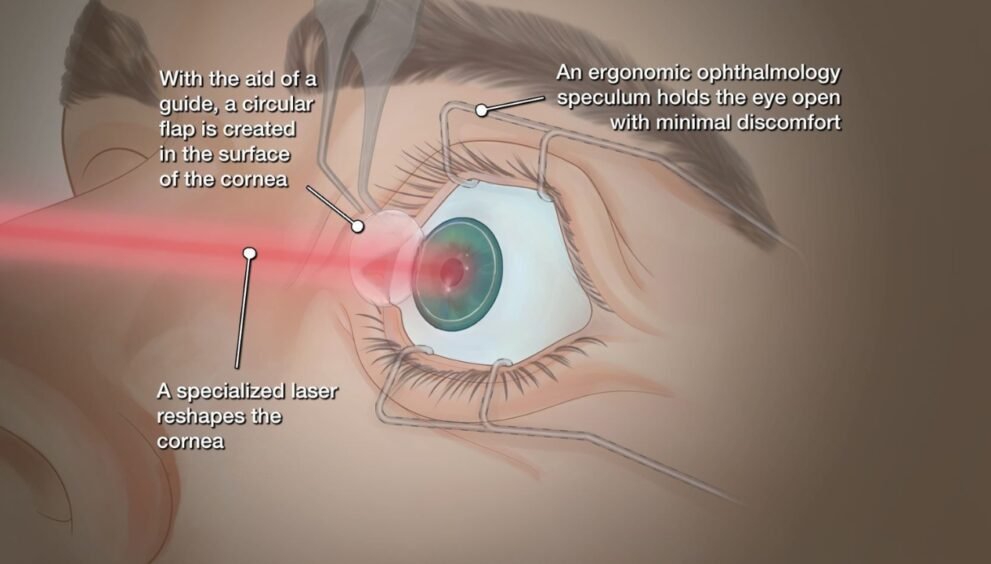How Long Does Laser Eye Surgery Take? Find Out Fast!

Laser eye surgery has become one of the most sought-after approaches for those in search of freedom from glasses and contact lenses. But many people ask, how long does laser eye surgery take? Understanding the duration of this method is vital for anybody considering it, especially for Americans who lead busy lives and need to plan their recuperation accordingly. In tis blog, we’ll explore everything you need to know about the time involved in laser eye surgery—from the preparation and procedure itself to the recovery process—while also examining expert opinions and scientific research to give you a complete picture.
Understanding Laser Eye Surgery: What Is It?
Before diving into how long laser eye surgery take, it’s crucial to understand what the procedure involves. Laser eye surgery, commonly known as LASIK (Laser-Assisted In Situ Keratomileusis), is a refractive surgery designed to correct vision issues such as nearsightedness, farsightedness, and astigmatism. The surgery reshapes the cornea using a laser to improve the eye’s focusing ability, allowing patients to see clearly without corrective lenses.
There are also other types of laser surgeries like PRK (Photorefractive Keratectomy) and SMILE (Small Incision Lenticule Extraction), each with slight variations in procedure time and recovery. Nevertheless, LASIK remains the most popular choice in the U.S. due to its quick results and minimal downtime.
How Long Does Laser Eye Surgery Take? The Procedure Breakdown
When asking “how long does laser eye surgery take?” it’s important to consider several stages: preparation, the actual laser application, and immediate post-op care.
Pre-Procedure Preparation
Typically, the preparation starts with a comprehensive eye exam that can last from 30 minutes to an hour. This step is essential to ensure you’re a good candidate for surgery and to customize the laser settings for your eyes. On the day of the surgery, once you arrive at the clinic, preparation involves numbing eye drops, sterilization, and positioning under the laser machine. This generally takes about 15 to 30 minutes.
The Surgery Itself
The actual laser procedure is surprisingly brief. For most patients, each eye takes about 30 seconds to 60 seconds to treat. However, when factoring in the time to create the corneal flap (for LASIK) or other preparatory steps, the entire surgery for both eyes generally lasts about 10 to 15 minutes.
Dr. Emily Chen, a leading ophthalmologist in California, explains, “Laser eye surgery is a swift and precise procedure. The laser reshaping phase is very brief, but the preparation and careful execution around it require attention to detail, which is why the total surgery time is longer than just the laser application.”
Immediate Post-Op Time
After the surgery, patients usually rest in a recovery area for 15 to 30 minutes before being allowed to go home. During this time, surgeons check the eye’s condition to ensure no complications arise immediately.
What About the Entire Recovery Process?
While the surgery itself is short, many patients wonder how long it will take to fully recover and enjoy the benefits of improved vision. Recovery varies based on the type of laser eye surgery and individual healing rates.
Short-Term Recovery
Most patients experience improved vision within 24 hours. However, fluctuations and mild discomfort such as dryness or irritation are common during the first week. Doctors typically advise avoiding strenuous activities, swimming, or makeup during this time to promote healing.
Long-Term Healing
Complete stabilization of vision can take several weeks to months. For example, PRK surgery involves a longer recovery period compared to LASIK, often up to three months before vision fully stabilizes. Regular follow-up visits are essential to monitor progress and address any concerns.
Factors Influencing the Duration of Laser Eye Surgery and Recovery
Several factors can influence how long laser eye surgery takes, both in the procedure itself and recovery.
Type of Laser Surgery
As mentioned earlier, LASIK tends to be the fastest both in surgery and recovery time. PRK and SMILE, while effective, generally require longer healing periods. Understanding these differences is crucial for realistic expectations.
Patient’s Eye Condition
The complexity of your refractive error affects surgery time. Higher prescriptions or irregular corneas might require more meticulous adjustments, potentially extending the procedure.
Surgeon’s Experience and Technology Used
Cutting-edge laser technology and a skilled surgeon can reduce procedure time and improve outcomes. Many American clinics invest in advanced equipment that enables faster and more accurate treatments.
Expert Insight and Scientific Evidence
According to a study published in the Journal of Refractive Surgery (2019), LASIK surgery averages around 10 minutes for both eyes, including preparation and treatment. The research highlights that patients typically achieve functional vision within 24 hours, with a low rate of complications when performed by experienced surgeons.
Moreover, research from Google Scholar emphasizes the importance of patient education on procedure time to reduce anxiety and improve satisfaction. Knowing exactly what to expect helps patients mentally prepare and adhere to post-op care instructions.
Why Understanding the Time Commitment Matters for Americans
In the fast-paced lifestyle of many Americans, time is valuable. Knowing how long does laser eye surgery take enables individuals to schedule their procedure without disrupting work or personal commitments unnecessarily. Additionally, understanding the recovery timeline aids in planning time off, arranging transportation, and managing expectations for vision improvement.
Conclusion: How Long Does Laser Eye Surgery Take? It’s Quick, but Recovery Is Key
In summary, laser eye surgery is a relatively quick procedure, with the actual laser treatment lasting less than a minute per eye and the total surgical process about 10 to 15 minutes. However, when considering pre-op preparation and immediate post-op care, the entire visit typically takes a few hours.
Importantly, the journey doesn’t end after surgery—the recovery phase varies depending on the procedure type and individual healing rates. While most Americans can expect significant vision improvement within a day, complete stabilization takes longer.
By understanding the full scope of time involved in laser eye surgery, patients can approach this life-changing procedure with confidence and clarity. As Dr. Emily Chen puts it,
“Laser eye surgery is not just about the minutes under the laser but the days and weeks afterward where proper care ensures lasting results.”
If you’re considering laser eye surgery, consulting with a qualified ophthalmologist and asking detailed questions about timing and recovery will help you prepare for a smooth and successful experience. Remember, investing a little time upfront results in years of clear vision and freedom.
Would you like me to help you practice discussing this topic or prepare for a consultation?
You may also read
Rotisserie Chicken Nutrition Facts: Shocking Truths Revealed








































































































































































































































































































































































































































































































